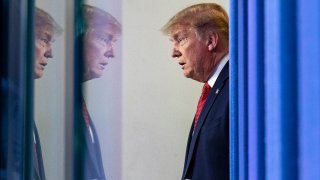
What President Donald Trump says and does often flies in the face of mainstream science. Coronavirus and the idea of injecting disinfectants is only the latest episode.
When a rare solar eclipse happened in 2017, astronomers and eye doctors repeatedly warned people not to stare directly at the sun without protection. Photos show Trump looked anyway. He later donned protective glasses.
For decades, scientists have called climate change a pressing issue, pointing to data, physics and chemistry. Trump regularly called it a hoax until recently. He also claims that noise from wind turbines — which he refers to as windmills — causes cancer, which is not accurate. He's also claimed that exercise will depletethe finite amount of energy a body has, while doctors tell people that exercise is critical to good health.
When Trump wanted to defend his warning that Alabama was threatened by Hurricane Dorian last year, he displayed an official weather map that had been altered with a marker to extend the danger areas. Alabama National Weather Service meteorologists were chastised by their agency chief when they issued tweets to reassure worried residents that they were not in the path of the hurricane.
Get Southern California news, weather forecasts and entertainment stories to your inbox. Sign up for NBC LA newsletters.
On Thursday, Trump raised the idea of injections of disinfectant to fight the coronavirus, which health officials warned would be dangerous. The president later claimed he was being sarcastic, although the transcript of his remarks suggests otherwise. Trump also suggested ultraviolet light, even internal light, could be a possible preventative measure, contrary to scientific advice.
On Friday, as the recorded U.S. death toll passed the 50,000 mark, the Food and Drug Administration issued an alert about the dangers of using a malaria drug that Trump has repeatedly promoted for coronavirus patients.
Asked what kind of grade he'd give Trump on science, M. Granger Morgan, a Carnegie Mellon University engineering and policy professor who has advised Democratic and Republican administrations, answered with a quick “F.”
“When he starts to air things like that (injection), it’s definitely a danger to the public because some people might actually do that,” saidNobel Prize-winning physicist Steven Chu, who was energy secretary in the Obama administration. “This isn’t science. This is something else.”
“Our president certainly has high confidence in his beliefs,” said Chu, chairman of the board of the American Association for the Advancement of Science, the world’s largest general scientific society. “Scientists always test their beliefs all the time. That’s part of the fabric of science.”
Trump seems to put science, medicine and controlled studies on equal footing with rumor and anecdotes, said Sudip Parikh, a biochemist who is chief executive officer of AAAS.
Mixing those two up when talking to the public is “terrible for communication,” Parikh said. It muddles and confuses the public, he said.
White House spokesman Judd Deere said “any suggestion that the president does not value scientific data or the important work of scientists throughout his time in office is patently false.” Deere pointed to “data-driven” decisions on the virus, such as limiting travel from highly infected areas, expediting vaccine development and issuing social distancing guidance to slow the spread of the virus.
Deere pointed to Trump saying on Thursday, “My administration has partnered with leading technology companies and scientific journals to create a database of 52,000 scholarly articles on the virus that can be analyzed by artificial intelligence.”
Presidents of both parties often put politics before science, and Trump is not unusual there, Morgan said. But this administration has regularly contradicted science and doctors.
“We’ve seen daily statements that run counter to reality, and science is about physical reality,” Morgan said. “Science matters.”
Both Morgan and Chu said Thursday’s ultraviolet and disinfectant comments could end up hurting people who don’t listen to doctors. They pointed to a case in Arizona where a couple misinterpreted Trump’s promotion of the malaria drug and wrongly used related chemicals; one of them died. Friday’s FDA warning was issued because of reports of dangerous side effects and deaths from the use of the malaria drugs in test treatments.
Gretchen Goldman, research director for the Union of Concerned Scientists’ Center for Science and Democracy, said the actions of Trump and his administration "have ignored science, censored science, manipulated science across agencies.”
“It’s a different beef than we’ve seen in past administrations,” Goldman said. “This administration, there’s a lot of disinterest and disrespect for science and the process.”
Her advocacy group listed 130 “attacks on science.”
Goldman published a survey this week in thepeer-reviewed science journal PLOS One that she and colleagues made of 3,700 federal scientists. Half of them said political interests hinder their agencies from making science-based decisions. One in five reported political interference or censorship of some kind either from political appointees in their own agency or in the White House.
Goldman said the survey, conducted in 2018 before the coronavirus outbreak, found that the highest level of scientists claiming White House interference was in the Centers for Disease Control and Prevention.
Meteorologist Ryan Maue, a conservative scholar, said that on policy, he and other conservatives like Trump’s agenda of deregulation, including pulling out of the United Nations’ Paris climate agreement. He pointed to increased funding of NASA and its return to the moon mission as pro-science, and added that the weather service is improving its forecast models.
But when it comes to communicating science, Trump “is a mess,” Maue said. He’s trying to be funny and folksy “and it doesn’t work and the media is eating that stuff up alive. And I think that’s fair.”
___
Associated Press writers Jill Colvin, Jennifer Farrar and Monika Mathur contributed to this report.
___
Follow Seth Borenstein on Twitter: @borenbears

